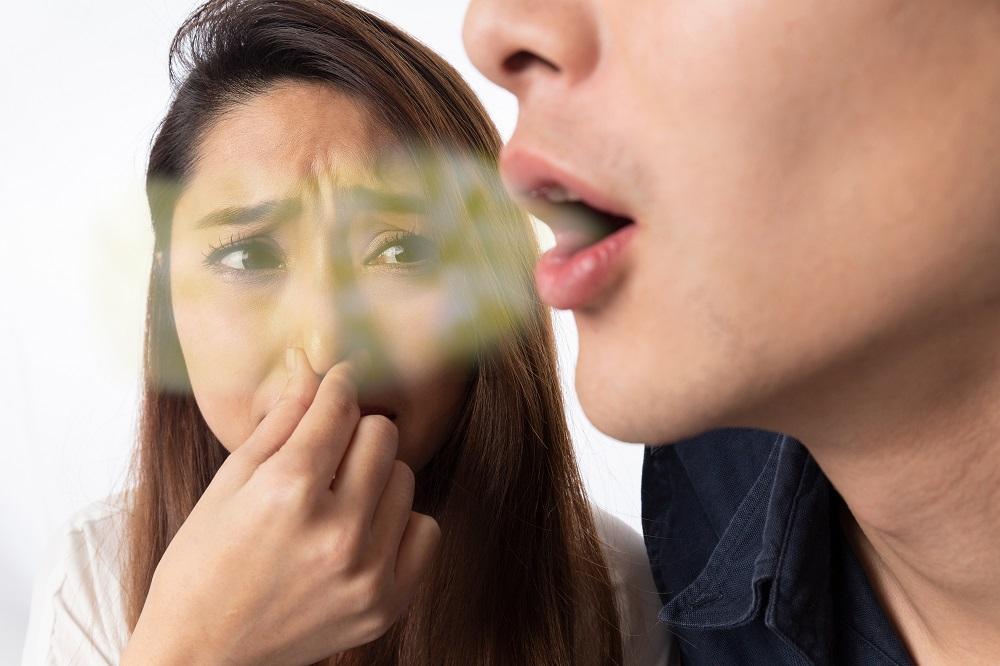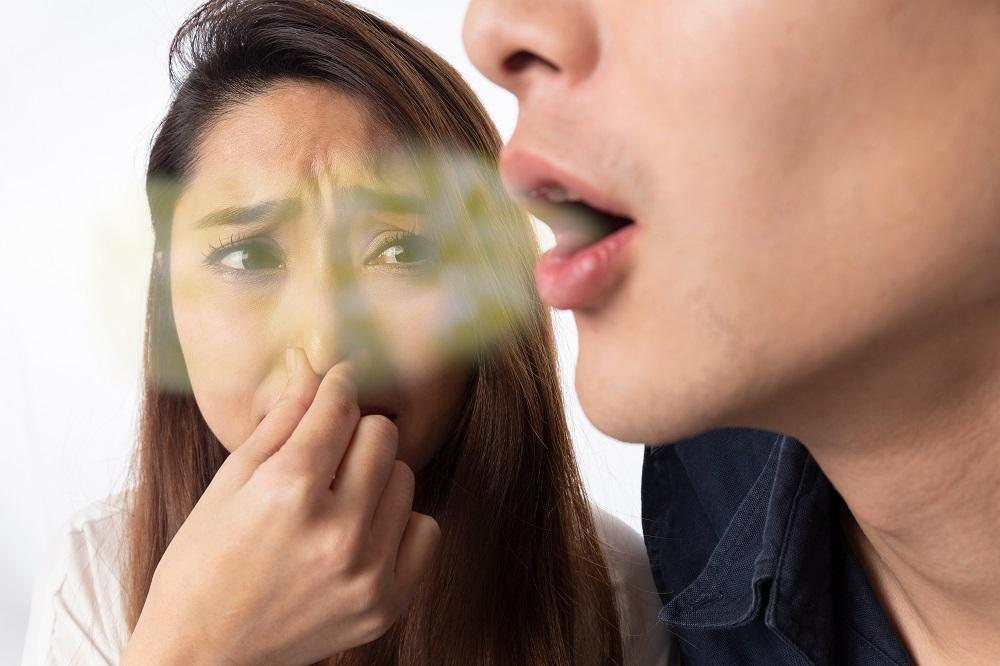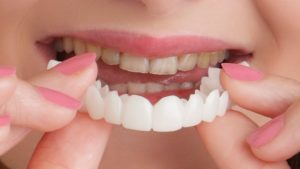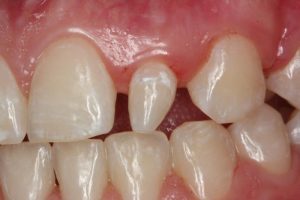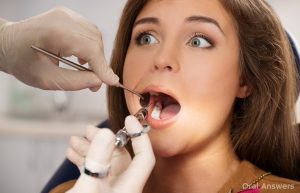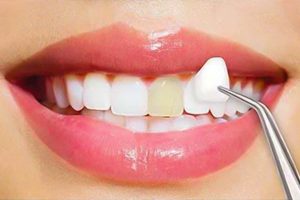My husband has bad breath. I don’t know what it is, but I’m embarrassed for him. It wasn’t so bad when we were first married, but it has kind of gotten worse. I don’t know why does my husband’s breath smell so bad.
He doesn’t have terrible oral hygiene so I don’t know what changed. I’m wondering if my husband has bad breath even after brushing, so what the best kind of mints or gum is for him, or if there is anything he can do so he has fresh breath when he’s at work or around other people nearby.
Thanks,
Elizabeth
Dear Elizabeth,
It’s hard to tell someone you care about that they have bad breath, but it can be even more difficult to cure because there are so many different causes. Let’s start with bacteria. Your mouth is a breeding ground for bacteria. There are over 700 different bacteria species that have been found in the mouth. They are working to break down the food that enters and is necessary for digestion and the natural, healthy functions of the mouth. When the bacteria break down protein, in particular, it creates a sulfur gas, which doesn’t smell good and can linger in the mouth.
Many people complain that their partner has bad breath. Sometimes it is the food itself that can cause bad breath or halitosis. Garlic, onion, tuna, and some dairies are often culprits for a bad smell left behind after being eaten.
Even sickness can lead to bad breath. If you have a cold or the flu, the drainage can emit an odor. If this were the cause of your husband’s bad breath, when the virus was gone, the bad breath should be, too. Some longer-lasting illnesses, such as acid reflux, may contribute to longer-lasting halitosis. Fortunately, there are medications for these kinds of health issues that may help alleviate the symptoms and, in turn, the bad breath.
How can you help the halitosis?
The list goes on, but some things may help with the halitosis. The first line of defense is good oral hygiene. This includes brushing after each meal, refraining from snacking between meals without cleaning, flossing daily, and regularly visiting the dentist. Using a mouthwash designed specifically for bad breath may help. Carefully cleaning the tongue and roof of the mouth is also suggested. These will help ward off halitosis from gum disease.
As for breath mints or gum for your husband’s breath, use caution. Many breath mints have sugar and bacteria feed on sugar. What you use to help the bad breath may make it worse. Make sure you only choose sugar-free gum or mints.
Different Ways to Cure Your Husband’s Bad Breath:
Addressing bad breath or halitosis involves a combination of personal and dental hygiene practices. Here are some tips to help improve your husband’s bad breath:
- Encourage Regular Oral Hygiene: Ensure your husband follows a consistent oral hygiene routine, including brushing teeth at least twice a day and using dental floss or an interdental cleaner to clean between teeth and gums.
- Clean the Tongue: Bad breath can often be caused by bacteria on the tongue. Encourage your husband to gently clean his tongue with a tongue scraper or by brushing it with a toothbrush.
- Stay Hydrated: Drinking an adequate amount of water helps prevent dry mouth, a common cause of bad breath. Encourage your husband to stay hydrated throughout the day.
- Limit Odor-Causing Foods: Certain foods like garlic, onions, and strong spices can contribute to bad breath. Encourage moderation and thorough oral care after consuming such foods.
- Regular Dental Check-ups: Schedule regular dental check-ups to address any underlying dental issues contributing to bad breath, such as gum disease or cavities.
- Quit Smoking: If your husband smokes, quitting can significantly improve bad breath. Smoking contributes to dry mouth and leaves a persistent odor.
- Use Sugar-Free Gum or Mints: Chewing sugar-free gum or using sugar-free mints can stimulate saliva production, helping to wash away bacteria and neutralize odors.
- Consider Mouthwash: Antiseptic or antibacterial mouthwashes can help reduce bacteria in the mouth. However, they are not a substitute for proper oral hygiene and should be used as directed
Bad Breath Can Result from Various Factors, Such as:
- Dental Health Issues: Persistent bad breath may be indicative of underlying dental problems, such as gum disease, cavities, or oral infections. Addressing the root cause is crucial for overall oral health.
- Dry Mouth: Reduced saliva flow, often associated with conditions like xerostomia (dry mouth), can contribute to bad breath. Saliva helps cleanse the mouth by neutralizing acids and washing away bacteria.
- Dietary Factors: Certain foods with strong odors, such as garlic, onions, or spicy foods, can contribute to temporary bad breath. Additionally, low-carbohydrate diets leading to ketosis may cause a distinct breath odor.
- Tobacco Use: Smoking and tobacco use can not only cause bad breath but also contribute to various oral health issues, including gum disease and increased risk of oral cancers.
- Medical Conditions: Some medical conditions, such as respiratory infections, sinusitis, diabetes, and gastrointestinal disorders, can be associated with bad breath. It’s essential to rule out any systemic health issues.
- Poor Oral Hygiene: Inadequate brushing, flossing, and tongue cleaning can allow bacteria to thrive in the mouth, leading to plaque buildup, tooth decay, and bad breath.
- Dentures and Dental Appliances: Improper cleaning of dentures or dental appliances, such as braces or retainers, can contribute to odor. Bacteria and food particles may accumulate on these surfaces.
- Medications: Certain medications can cause dry mouth as a side effect, leading to bad breath. It’s essential to discuss any concerns about medication-related side effects with a healthcare professional
Conclusion:
Addressing bad breath involves identifying and treating the underlying cause. Regular dental check-ups, maintaining good oral hygiene practices, staying hydrated, and addressing lifestyle factors can significantly contribute to preventing and alleviating your partner’s bad breath.
If the problem persists, consulting with a dentist or healthcare professional is advisable for a thorough evaluation and appropriate intervention.
